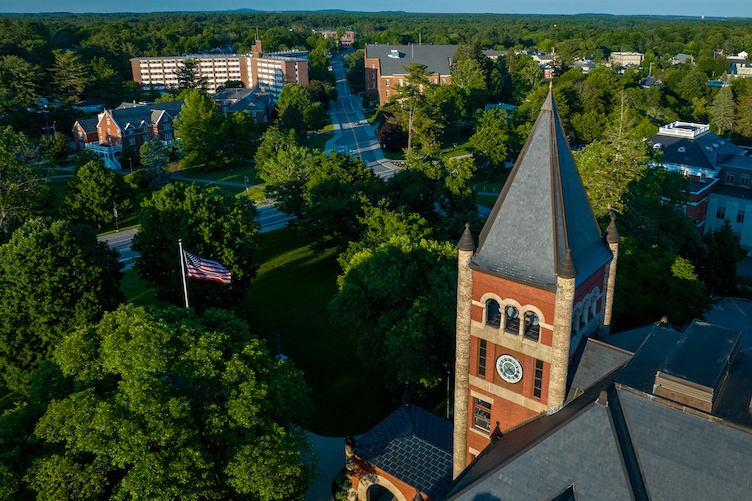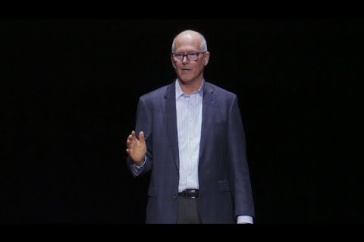
The University System of New Hampshire (USNH) will exceed $200 million in biennial state support for the first time since fiscal years 2010-11 as a result of a state budget recently signed by Gov. Chris Sununu. The combination of operating, capital and one-time surplus support for USNH will be $216 million for the biennium, a 12.5% jump from the current budget.
UNH President Jim Dean expressed his gratitude to state legislative leadership for investing in UNH and the university system throughout New Hampshire in an op-ed published by New Hampshire Business Review, calling back to early discussions held at a business roundtable event held in conjunction with the Business and Industry Association of New Hampshire (BIANH) at UNH Manchester on Jan. 31.
“Earlier this year, the University System of New Hampshire and Business and Industry Association convened a group of employers to discuss workforce challenges and to ask the state to invest in our public colleges and universities. Additional resources were needed to support students, partner with employers, and meet the demands of a strong and growing economy,” Dean says in the op-ed. “Gov. Chris Sununu and legislative leadership responded to this call and made education funding a priority. The new, bipartisan state budget provides a meaningful increase in state support in postsecondary education and signals a renewed commitment to public higher education in New Hampshire.”
"Gov. Chris Sununu and legislative leadership responded to this call and made education funding a priority. The new, bipartisan state budget provides a meaningful increase in state support in postsecondary education and signals a renewed commitment to public higher education in New Hampshire."
The annual USNH appropriation in the state budget will increase from $88.5 million this year to $95 million in each of the next two years. This recurring funding is supplemented by $3 million in one-time surplus support targeted at Keene State College and Plymouth State University, as well as $17 million in capital support to fund projects at each campus, including the completion of the Spaulding Hall renovation and expansion at UNH.
UNH prioritized collaboration with the New Hampshire business community throughout the budget process, most notably at the business roundtable event Dean referenced. Dean was joined by the presidents of Keene State College and Plymouth State University, Melinda Treadwell and Donald Birx, respectively, as well as a host of New Hampshire business leaders for a discussion highlighting the critical impact USNH institutions have on the state’s businesses and economy.
“We hear loudly, clearly and consistently from our state’s business leaders that the workforce shortage threatens our future. Addressing this challenge requires collaboration between the state, business community and higher education. Investments are necessary to bring down the cost of education, to develop and sustain innovative programs, and ensure the viability of the educational institutions that serve as regional and statewide economic engines,” Dean says in the op-ed. “The budget passed by the House and Senate includes several priorities to help ease New Hampshire’s workforce shortage. In addition to increased postsecondary education funding for New Hampshire’s community college and university systems, the budget reauthorizes expanded Medicaid, increases support for New Hampshire’s Affordable Housing Fund and invests additional funds to expand access to affordable child care.”
USNH institutions have a significant impact on the recruiting and retention of young talent in New Hampshire. Dean noted in the op-ed that 11,000 young people come to New Hampshire each year from around the country, joining 12,000 Granite State residents who chose USNH to further their education. His message highlighted the fact that nearly 19,000 graduates from the classes of 2012 through 2020 are working in New Hampshire today.
“Keeping tuition as low as possible is essential to attracting even more Granite State high school students to postsecondary educational opportunities in New Hampshire. Over the last decade, USNH has established itself as one of the most efficient public university systems in the country,” Dean says in the op-ed. “Despite sharply rising costs, in-state tuition has been flat for five years, and – through investments in financial aid – net in-state tuition has fallen over that time. All this while maintaining strong graduation rates and levels of post-graduate student success. Taxpayers should be proud of this record, and USNH is committed to continuing to earn their support.
“The Legislature’s increased investment will help New Hampshire retain more young people and build a broader, stronger future workforce of highly competent critical thinkers, who contribute deeply to our economy, communities, and quality of life. We’re proud and thankful to see our leaders in Concord take constructive action to provide resources to allow the state’s economy to continue to grow and increase prosperity for all.”
-
Compiled By:
Keith Testa | UNH Marketing | keith.testa@unh.edu



















































